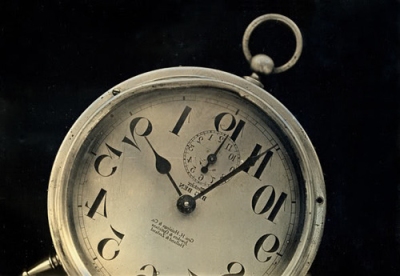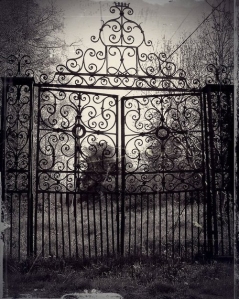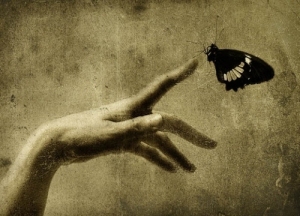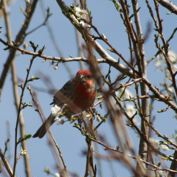“… the idea of time recedes with the expansion of consciousness.”
P.D. Ouspensky.
“For a believing physicist like myself, the separation between past, present, and
future has the value of a mere, albeit stubborn, illusion.”
Albert Einstein.
“The lack of an absolute standard of rest meant that one could not determine
whether two events that took place at different times occurred in the same position
in space.”
Stephen Hawking.
“Most people believe that time passes. In fact it stays where it is.”
Dogen.
She awoke from a dream, of a field of ripening grain which seemed to her like a field of yellow hair undulating in all its glorious opulence. The sight stirred her quiescent blood like a memory, she remembered someone had called it the colour of torch-light. She had buried her lips in that memory. She knew it would pass in a moment. She gathered her moments now with a greater urgency. Now the twilight was deepening ever faster and darkness with its smattering of stars chased away the last glimmers of her youth. Her chair on the shadowed front porch was more frequently occupied, and chores formerly attended to with such sedulous purposiveness, now tended to be forgotten. She was otherwise engaged. Only the cat by dint of its unremitting importunities broke into her reveries, contriving in the instinctual manner of animals to secure for itself a daily saucer of near sour milk. But the silent potted poinsettia and ficus in the living room expired in a prolonged dry attenuation, all unnoticed.
undulating in all its glorious opulence. The sight stirred her quiescent blood like a memory, she remembered someone had called it the colour of torch-light. She had buried her lips in that memory. She knew it would pass in a moment. She gathered her moments now with a greater urgency. Now the twilight was deepening ever faster and darkness with its smattering of stars chased away the last glimmers of her youth. Her chair on the shadowed front porch was more frequently occupied, and chores formerly attended to with such sedulous purposiveness, now tended to be forgotten. She was otherwise engaged. Only the cat by dint of its unremitting importunities broke into her reveries, contriving in the instinctual manner of animals to secure for itself a daily saucer of near sour milk. But the silent potted poinsettia and ficus in the living room expired in a prolonged dry attenuation, all unnoticed.
She liked the front porch. The porch swing, the small gate-legged table piled high with yellowing journals covered with the indecipherable script she had so long affected as a guardian to her privacy, all lay fallow, trapped with her in a long suspension. It was a 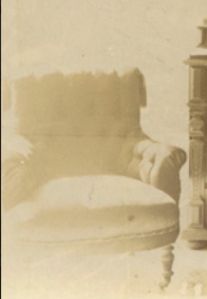 privacy no one had bothered to invade in all these years. She gazed at her chair, an overstuffed phenomenon of patchily fading claret, so solid and unmoving.
privacy no one had bothered to invade in all these years. She gazed at her chair, an overstuffed phenomenon of patchily fading claret, so solid and unmoving.
The chair connected her to the past. It had been a gift from an old friend, delightful and epicene, whose friendship had been a casualty of her marriage. Her friend had made his living in ‘home-furnishings.’ She laughed mirthlessly, recalling the phrase. He had now long since turned to dust, who in his way had tried to warn her. But she hadn’t listened, had she? His cautionary tale had missed its mark, as had that of the first Christian missionaries who described the terrors of hell to the inhabitants of Iceland, which then caused the doughty natives to respond “We shall be warm! We shall be warm!”
But he would have understood her sense of urgency about the present and the effort she was making now. He would have understood her sense that the clock hanging on her wall, a plain Seth Thomas (“What sayeth Thomas?” she mumbled,) now silent from her neglection, still slyly indulged its devouring predilection in the secrecy of a parallel universe. “What is time?”– She answered herself: “Just something a clock measures.”
She had hidden her husband’s prized Hunter under a pile of rags in the walnut wash stand (he had loved watches, as she despised them now), but the clock defied her efforts to lower it from its accustomed place above the dusty whatnot. What did it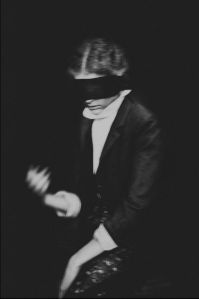 matter. She could avoid its bland and frozen gaze by averting her own whenever she made her way through the house. Her gaze was turned more and more inward now. The cost of looking outside she disbursed prudently and with a calculated thrift.
matter. She could avoid its bland and frozen gaze by averting her own whenever she made her way through the house. Her gaze was turned more and more inward now. The cost of looking outside she disbursed prudently and with a calculated thrift.
Her old black dress grew shabbier and fustier, taking on a rusty sheen like the patina of ancient metal. She didn’t seem to notice. She was trying to notice other colours; the colours in her rioting untrammeled garden; the magenta cosmos, the violent yellows of the marigolds bordering the fence, planted years ago and persistently self-seeding. They were put there to deter the aphids from her prized roses. No matter that the roses, neither pruned nor divested of their hips for several seasons, had succumbed to their own dilatory expression of blooming, in a recalcitrant rhythm rather resembling her own. She noticed the passage of time as an interlocution – the drab sparrows chirping in the gnarled branches of her ramblers, saying “Why? why?”, and the silent swarms of gnats hanging suspended in the air offering their tacit answer after the passing of a sprinkling rain.
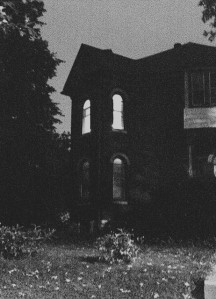 The mint patch spilling over its nominal boundary of stones was frequented by swarms of paper wasps, who, having constructed a sinister convolution under the dove cote, had forced the doves to move elsewhere. She noticed all these intrusions of the natural world with a vague tolerance, as a reverberation of vitality allowed to impinge on her thoughts. Yet she was busy recording her moments. She was occupied. It was her time of expurgation.
The mint patch spilling over its nominal boundary of stones was frequented by swarms of paper wasps, who, having constructed a sinister convolution under the dove cote, had forced the doves to move elsewhere. She noticed all these intrusions of the natural world with a vague tolerance, as a reverberation of vitality allowed to impinge on her thoughts. Yet she was busy recording her moments. She was occupied. It was her time of expurgation.
She had dragged her bed into the parlour because the path of the moon in summer traversed the arc of its window during the night. She extinguished the porch light because it pained her that so many fragile visitants, drawn irresistibly to it, met their desperate ends against a treacherous illumination. No lesser lights competed with the milky effusions she so loved to study. She welcomed the encroachments of clouds in the night sky, as they hung suspended over the tree-tops, and described to herself the colours of the gauzy shadows. Sometimes they made her smile pensively.
Summer was now like a woman, who after having played out her passion lies still, her eyelids closed, her heartbeat slowing to a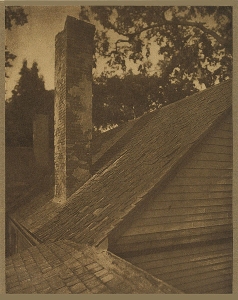 quieter rhythm, letting her skin cool to the touch of a lover. She loved and feared this season with its hint of death in the yellow tinted leaves. Its cooling breezes rattling the branches of her elm and the world, filling with a sibilant echo, were tinged with a hint of menace, malevolence and dread. She was receptive to their suggestion.
quieter rhythm, letting her skin cool to the touch of a lover. She loved and feared this season with its hint of death in the yellow tinted leaves. Its cooling breezes rattling the branches of her elm and the world, filling with a sibilant echo, were tinged with a hint of menace, malevolence and dread. She was receptive to their suggestion.
A long time ago before she had married and made this her home, she had lived in a far larger and more ancient house. The scenes of her childhood had been played out on balconies where the moonlight splashed like cool water on old stone ledges, and where mosses and creeping vines hid amongst the deeper shadows visible from her window. In rooms above the stairs, the skylights wantonly admitted the moon, and the walls were scattered with the shadowy fluttering shapes of leaves and branches, which sometimes suggested themselves into intuitions. There she had watched with someone, waiting and awaiting her time.
The name she searched for was elusive. She had forced herself to forget that name, and now her memory stubbornly persisted in retaining its obsolete instruction despite her repeated promptings. Perhaps she had forgotten the name, but the rest she could 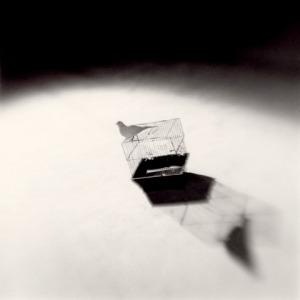 not forget.
not forget.
There had been someone, bright and quick, who slipped easily into being imperious, and who had not a trace of melancholy. This other was full of youthful enthusiasms, affectations of the decadence of most things French, Baudelaire, “Gaspard de la Nuit,” Ravel, flirting with the romantic darkness which youth prefers to the plain good sense of older folks. She read “Undine” aloud: she refused to let the time merely pass. She made the moments urgent, as if she had known there was a reason to. But she had also known how to speak softly, and wait for her words to sink in.
But it was all so long ago. A vagueness and disquiet still overcame her when she tried to remember. The cat stared at her with his yellow eyes: Yellow as the moon, as the marigolds, as the hair she remembered. She had read an old poem once, written by a woman, about hair yellower than torch light. She must remember: Something important depended upon it.
She walked urgently to the empty bedroom, hurriedly searching among the things in the unlit closet. She delved feverishly in its recesses, amongst the folds of the dark and musty garments of another time, plundering their secrets for the thing hidden from herself. Yes, now she remembered. But now she almost did not wish to remember. She grew faint with the remembering, sitting with her head bowed, on the cool floor amongst the old dresses.
delved feverishly in its recesses, amongst the folds of the dark and musty garments of another time, plundering their secrets for the thing hidden from herself. Yes, now she remembered. But now she almost did not wish to remember. She grew faint with the remembering, sitting with her head bowed, on the cool floor amongst the old dresses.
So these were the memories she had evaded. She remembered. She remembered the garden:
The garden was strung with Japanese lanterns shedding their intimate light on the leaves and grass, and, preeminently for her, on the women, beautiful, strange, alluring, and exotic: women of unassailable poise and elegantly travested sex.
She looked at the picture in her hand; at the sleek head, the clear and deeply thoughtful gaze.
She remembered.
“Walk with me in the garden. I want us to disappear for a moment. I’ll introduce you to everyone later.”
“Shouldn’t we do that first? Don’t you think they might find us rude?”
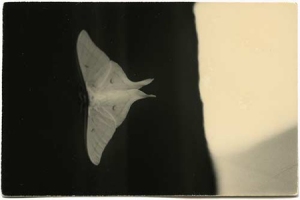 “Who? these women? Heavens no! They only observe proprieties in the breach: If they notice we’re missing they’ll know why!”
“Who? these women? Heavens no! They only observe proprieties in the breach: If they notice we’re missing they’ll know why!”
“And what is why? – I’m afraid I’m not as sophisticated or bohemian as you are, and I can’t tell at all if I’m behaving strangely or simply fitting in!”
“Oh you fit in all right. All that is needed is that you be beautiful, and you are!”
Are you teasing me by quoting Baudelaire again?”
“Oh that! ‘What do I care if you be wise, be beautiful, be melancholy’?”
She paused to turn and look over the hydrangea bush at some couples dancing in the punctuated light,
‘Why, no, not entirely: I could never be so rash as to discount wisdom – and I wouldn’t ever wish you sad.”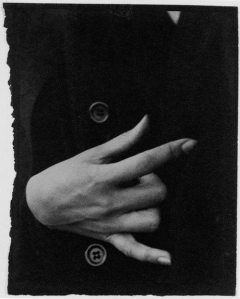
“I am not reassured. I suddenly feel as if I’m in another world.
She looked at the tall woman standing next to her in the suggestion of light as a match flared, a cigarette lit.
“I suddenly feel that I don’t know you, and that its you I need introducing to.”
“You do know me. You’ve always known me – and if you don’t you shall! – But you’re right. This is another world. It’s a world that I’m making mine, and Darling, I do so want you in it. And you needn’t worry about meaningless conventions, they’re not needed here.”
“But I was brought up to be conventional, and surely we still need to be polite!”
“But that’s exactly what I’ve been trying to tell you. Everyone here has made either a career or a religion of breaking the rules anyway, and I’ve already told them this is your first party – of this sort. They expect you to behave a little strangely.”
“I’ll hold you responsible for any faux pas I might happen to make; since I don’t know which rules I’m supposed to break, I might break all the wrong ones!”
“It won’t matter, and then you could blame me for any lapses. Its rather expected of me I’m afraid! But look, 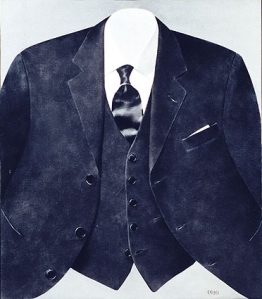 how busy with each other they all are. No one is looking at you – at us.”
how busy with each other they all are. No one is looking at you – at us.”
She had continued her halted thought –
“I’m afraid I would be stupid – not melancholy or sad – but I think I’m just a little afraid.”
They had moved away from the intimate conspiratorial voices of the revelers, as they sat talking in convivial groups on the lawn and away from the sporadic glow of cigarettes and the fading sound of the gramophone, its needle now suddenly stuck persistently in the groove of some repeated phrase in the smoky rendition of the love song which had been drifting over to them in tinny fragments.
She felt, rather than knew, that something culminal was about to happen. Something in her quickened.
She was pressed against the trunk of an elm. She felt its corrugated bark stick to the backs of her arms and her summer dress and she felt the bruising intensity of hands. She was being kissed.
She felt like a drunken moth pinned to the wax board, but she didn’t care. A heady reckless excitement 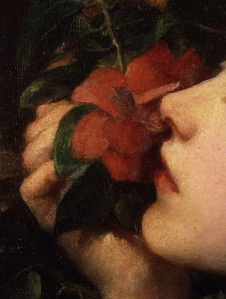 overtook her in the darkness. The glint of fiery hair against a dark fabric seemed like a lapse of memory, or a flaring of unbidden imagination, she wouldn’t know which; but somewhere there was the image of a pale wrist and long blunt fingers poised on the dark wool of a thigh, and then the alchemical transmutation of her “No, no” To a gradual “Yes,” in a sudden rush of love or need, or a desire she never guessed would haunt her in the years to come. No names or words or concepts seemed as if they could intrude, but there was improbably imposed on her impressionable mind, a night with the association of a sonnet.
overtook her in the darkness. The glint of fiery hair against a dark fabric seemed like a lapse of memory, or a flaring of unbidden imagination, she wouldn’t know which; but somewhere there was the image of a pale wrist and long blunt fingers poised on the dark wool of a thigh, and then the alchemical transmutation of her “No, no” To a gradual “Yes,” in a sudden rush of love or need, or a desire she never guessed would haunt her in the years to come. No names or words or concepts seemed as if they could intrude, but there was improbably imposed on her impressionable mind, a night with the association of a sonnet.
That was what she remembered. That in summary was the recapitulation of her brief capitulation.
And this was the part she both must remember and needed to forget: No matter that it might have been that her hand was forced, or that she might have been tipped out of the boat before she had  learned to swim. What mattered was the flash of instant and incontrovertible recognition, of her utter familiarity with the element, regardless of how deep or disturbing, regardless of how much unanticipated.
learned to swim. What mattered was the flash of instant and incontrovertible recognition, of her utter familiarity with the element, regardless of how deep or disturbing, regardless of how much unanticipated.
What followed was by any standard a craven repudiation.
For later, she had again returned to ‘No’.
Some hidden demon in her of obduracy and panic brought the new, fragile world down around them both in sharpened splinters. She ignored the anguished “Don’t do it.” The passionate admonitions, the “What profiteth a man” – or a woman for that matter. She resolved her dissonances in an oracular fashion, based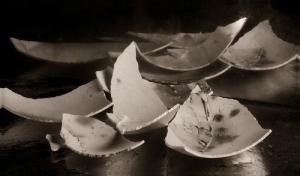 on a reading of the splinters of signs, and so she could not, would not, know the full extent of what she must keep hidden.
on a reading of the splinters of signs, and so she could not, would not, know the full extent of what she must keep hidden.
She had been driven home in a sober, fractured silence. She had had a total failure of nerve: And of something else.
She could now see that there could have been no gracious introduction possible for a mind caught in the vice of a fearful conventionalism drawn to masquerade itself in injured modesty, and weeks later, alone in 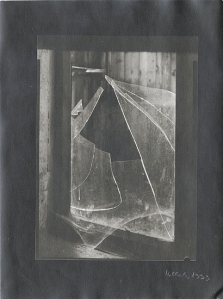 her room, she had succumbed to a fit of silent panic. The terrifyingly personal events of that night, indistinguishable to her from what she had chosen, in her confusion, to think of as negligently cruel, blotted out her senses as surely as a powerful surge overwhelming a delicate circuit.
her room, she had succumbed to a fit of silent panic. The terrifyingly personal events of that night, indistinguishable to her from what she had chosen, in her confusion, to think of as negligently cruel, blotted out her senses as surely as a powerful surge overwhelming a delicate circuit.
She chose Edwin, chose him deliberately as a dubious refuge; but from what? Perhaps she had sought to lay her secret self where she was certain it would be unassailably safe; in the hands of someone who was incapable of receiving it. Edwin, she thought, and his preoccupations with ledgers, profits, bonds and emoluments, with actuarials and compounding interests – Edwin would suit her. Perhaps he had laid his devotion at her feet for the same reasons.
She laughed a cracked laugh remembering. She had excised a part of her soul, and a scar had grown around the gash, which in some strange way had proven itself more tender than the wound, but she had done her best to see to it that there was no longer anything she could cut or burn herself upon.
There had been nothing fiery about Edwin. His sparse demonstrations, as most other things about him, left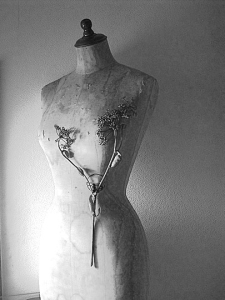 her unmoved. His smell not her smell. She bore his fumbling excursions into a self, whose inviolability he could not fully perceive, borne with a knowledge of her deservedness.
her unmoved. His smell not her smell. She bore his fumbling excursions into a self, whose inviolability he could not fully perceive, borne with a knowledge of her deservedness.
The marriage had been not so much a marriage as a misunderstanding: a false agreement. It had not been a fair exchange: Oh no, not at all.
But somehow the years passed in a paradox of ever deferred and ever elusive resolution, and somehow, this thing in her, all mixed with pain and love, death and remembrance, refused to diminish. Now it was all so finally and beautifully clear.
She stood up and gazed in the mirror, at her reflection, her extreme slenderness, her fading hair, her delicate neck, her declivity of cheek, her full lips. Her eyes filled with derision. She felt a long exhalation. She knew what she most had wanted; most had feared.
She walked into the garden, picking the marigolds, filling her bosom with their bitter scented pungency 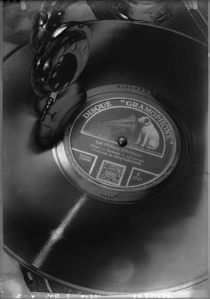 until they spilled unheeded onto the long grass. She returned to the bedroom and severed the stout sash from the dusty blinds. She poured all that was left in the bottle of milk into a blue mixing bowl and set it before the cat, watching him taking pleasure in the simple act of feeding. Then, surrendering to a sudden impulse, she wound the clock.
until they spilled unheeded onto the long grass. She returned to the bedroom and severed the stout sash from the dusty blinds. She poured all that was left in the bottle of milk into a blue mixing bowl and set it before the cat, watching him taking pleasure in the simple act of feeding. Then, surrendering to a sudden impulse, she wound the clock.
She took the journals from the table and marked a page she remembered with a photograph. The wind chimes stirred in a sporadic murmur, and she suddenly yearned for music. She wound up the gramophone and put on a record.
The sash brought down a shower of dust upon her as it snaked over the beam. The wind chimes stirred again, in what seemed like the commencement of a sacred liturgy. The arced sliver of moon followed its nightly purpose.
“I’ll only be a moment”, she thought.
The table wobbled, but held her weight for a moment before it crashed against the porch railing, then fell its splintering way to the grass below.
The gramophone needle continued its fallow hiss as she smelled the marigolds, remembering their colour.
The clock began to strike.
The plangent sounds of the clock rang suddenly out, almost causing him to spill his coffee. It brought him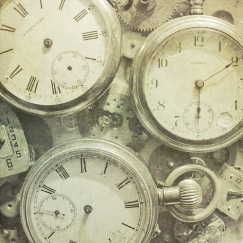 back to the present in the unavoidably disturbing way clocks have of intruding into inner lives; disrupting them, taking them over and loudly asserting that the tyranny of the here-and-now could never be broken. He wished it could: that time could somehow be turned back on itself, and life remade simple. He struggled with a welter of emotions; fragments of the previous night, a persistent sense that something was going wrong and slipping out of his grasp, and the disturbing thought that perhaps his wife did not find him to be entirely agreeable.
back to the present in the unavoidably disturbing way clocks have of intruding into inner lives; disrupting them, taking them over and loudly asserting that the tyranny of the here-and-now could never be broken. He wished it could: that time could somehow be turned back on itself, and life remade simple. He struggled with a welter of emotions; fragments of the previous night, a persistent sense that something was going wrong and slipping out of his grasp, and the disturbing thought that perhaps his wife did not find him to be entirely agreeable.
Breakfast had been served, eaten, and its remains cleared away, but he still continued to sit at the table. He seemed absent; his mind elsewhere, not so much assailed by as imbued with impure thoughts, which he sought ineffectually 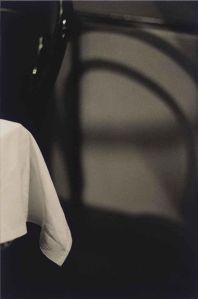 to brush aside as he did the crumbs on his linen waistcoat. He wadded the table napkin in a sweaty hand, fingering the letter which lay beneath it. A slight sound escaped him, of displeasure at his internal disquiet, of sour denial. But the thoughts reoccurred. Strangely, in an ironical twist of uxoriality gone awry, his wife was the object of his prurient ruminations. He watched her secretly as she went about her business, tidying and cleaning, putting up and putting by. He had his secret speculations with regard to the cause of her imperviousness to his attentions, but they did not fit themselves neatly into any reconstruction of her past, at least not as he knew it. He knew she was chaste. His misgivings did not include any speculations about her frames of reference and never extended to the unsafe ground of objective comparison. Still, it irked him fiercely that while he was transformed by ardour to gibbering puerility she remained poised and dignified. She seemed to succumb to his invasive attentions with a secret grace and an unassailable dignity.
to brush aside as he did the crumbs on his linen waistcoat. He wadded the table napkin in a sweaty hand, fingering the letter which lay beneath it. A slight sound escaped him, of displeasure at his internal disquiet, of sour denial. But the thoughts reoccurred. Strangely, in an ironical twist of uxoriality gone awry, his wife was the object of his prurient ruminations. He watched her secretly as she went about her business, tidying and cleaning, putting up and putting by. He had his secret speculations with regard to the cause of her imperviousness to his attentions, but they did not fit themselves neatly into any reconstruction of her past, at least not as he knew it. He knew she was chaste. His misgivings did not include any speculations about her frames of reference and never extended to the unsafe ground of objective comparison. Still, it irked him fiercely that while he was transformed by ardour to gibbering puerility she remained poised and dignified. She seemed to succumb to his invasive attentions with a secret grace and an unassailable dignity.
The years since their marriage had not dimmed her loveliness, and 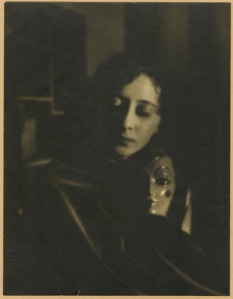 instead of the pall of familiarity which customarily infects unruffled connubial arrangements, a certain withdrawal, a subtle imposition of distance had ‘leant enchantment to the view.’ Her eyes and skin retained the brilliance of youth, but now an additional depth, something he had not seen before, enhanced the currency of her ordinary beauty.
instead of the pall of familiarity which customarily infects unruffled connubial arrangements, a certain withdrawal, a subtle imposition of distance had ‘leant enchantment to the view.’ Her eyes and skin retained the brilliance of youth, but now an additional depth, something he had not seen before, enhanced the currency of her ordinary beauty.
“Edwin, are you staring at me? Have I spilled something on my dress?”
He struggled for a semblance of composure, mumbling something about her brooch as she turned to lift the sash which opened the window.
He loved his wife. Didn’t he? He stood in secret awe of her. She spoke French with an old-fashioned propriety, played the piano with a personal delicacy, and sang in a slightly husky voice which, though it would assuredly forfeit a purist’s approval, retained in charm and appeal what it lacked in training. He loved his wife, but he could not 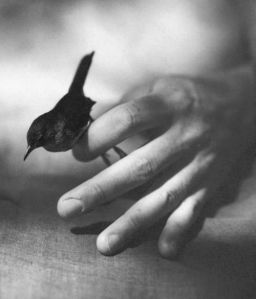 fathom why she had chosen him for a husband, and he could never tell if she loved him, though he had come to assume it.
fathom why she had chosen him for a husband, and he could never tell if she loved him, though he had come to assume it.
If he had been more emotionally gifted, more perceptive in the area of the female psyche, or more experienced with women, he might have apprehended the elemental incongruity of her choice, but he was none of these. He was not romantic, or temperamentally disposed to romance. He was merely heir to a species of disturbance which perhaps in other men might have evoked a more surreptitious expression of concupiscent impulse, or a weakness for drink, but in him only caused a deepening of gruffness and an undue emphasis on his already unappealing habits of physicality, his involuntary grunts, untimely sighs and persistent indigestion.
“You have a letter from Vivian.”
She stopped her wiping of the whatnot and stood motionless for a moment.
“Yes I know. It’s an invitation to tea this afternoon. She was expecting some new gramophone records to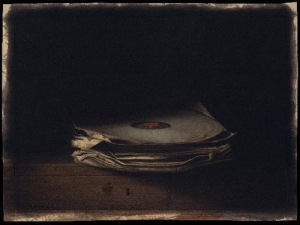 arrive in the mail last week – We were going to listen to music.”
arrive in the mail last week – We were going to listen to music.”
He struggled with the upsurge of ire which threatened to choke him, dumbly suppressing it, absurdly wounded by the unconscious intimacy of that ‘we.‘ She caught his look and looked away. He managed to speak. “Will you be home for dinner?”
“I might be, but if I’m not you needn’t worry; I’ll leave you a casserole and some dessert in the oven.”
It was not his dinner he was worried about. It was her. But what could he say?
He detested that woman and thought her ‘unnatural’. And he was right, at least based upon his limited 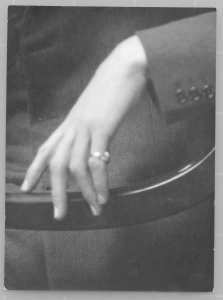 suppositions of what was to be deemed natural in women. She was all that made him uneasy: a childhood friend of his wife’s, and therefore claimant to a deeper and longer standing intimacy than he suspected as being his own, a bluestocking, someone who read Latin, Greek and French!, someone he supposed his parents would have referred to as being “upper-crust.” Above all, she was a woman of independent means: a thoroughly bad influence.
suppositions of what was to be deemed natural in women. She was all that made him uneasy: a childhood friend of his wife’s, and therefore claimant to a deeper and longer standing intimacy than he suspected as being his own, a bluestocking, someone who read Latin, Greek and French!, someone he supposed his parents would have referred to as being “upper-crust.” Above all, she was a woman of independent means: a thoroughly bad influence.
He was completely unable to voice his thoughts. If he were so imprudent as to do so, his wife would then accuse him of trying to start a quarrel, and with her characteristic deftness of speech, convert his innocuous words into some bitter thing with a lingering aftertaste. She would by effortless implication make him feel as if he’d misread his lines and committed a ghastly violation of his prescribed role. He would then find himself entangled in an intractable net of resentment and inexpressible frustration. He felt his stomach begin a symphony of disquiet against the background of his angry thoughts. He glanced at his Hunter in an effort to compose himself and began readying himself to leave the house.
He had heard about this woman, his wife’s newly returned friend, from his own friends, the ones he played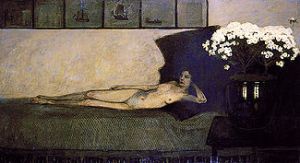 poker and billiards with. He had been told of a very uncertain past, of outlandish dress, of books and pictures delivered – French novels, lithographs. His queasiness increased at the thought of a French novel he had read: One about a besotted husband and an uncontrollably romantic wife who deceived him, exulting in her deception, “I have a lover! I have a lover!”
poker and billiards with. He had been told of a very uncertain past, of outlandish dress, of books and pictures delivered – French novels, lithographs. His queasiness increased at the thought of a French novel he had read: One about a besotted husband and an uncontrollably romantic wife who deceived him, exulting in her deception, “I have a lover! I have a lover!”
It didn’t bear thinking about. He knew he must not speak. To do so would mean to admit that he allowed himself to be the recipient of indiscreet garrulosity 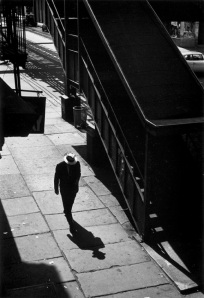 and gossip; that his friends in the post office steamed open letters and packages, and that he had let himself be informed by a cleaning lady who had been persuaded by one of their wives to inspect bookshelves and somewhat else besides in that house she was being paid to clean.
and gossip; that his friends in the post office steamed open letters and packages, and that he had let himself be informed by a cleaning lady who had been persuaded by one of their wives to inspect bookshelves and somewhat else besides in that house she was being paid to clean.
His wife would not fail to appreciate the irony if he complained about her friend’s questionable morality, thus laying his own vulnerabilities unacceptably bare. She would not fail to use her rebarbative wit in a devastating riposte. He was not her match. He knew it.
This was new in their marriage. This unsheathed display of sharpened wit and mental acuity. It disconcerted him. It showed up his own species of intelligence – so aptly suited to bureaucracy and accountancy and fiduciary administration – as meagre, and exiguous, which is to say, to no advantage at all. He rather felt as if he had suddenly found a kitten, who had hitherto only purred by the fire, to be possessed of an uncalculated yet devastatingly effective atavism. His own primitive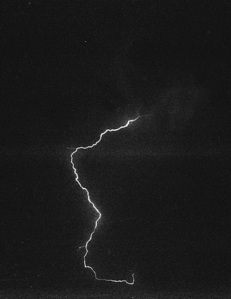 instincts, if he had ever had any to begin with, had been dulled by generations of placid good breeding between sober clerks and the dull daughters of others such. He was about to give voice to some uneasily shaping thought, which had to do with his antipathy. It had something to do with her manner when she returned from these visits; her accentuated thoughtfulness and inwardness, as if she were visibly infected with a reflectiveness he could not hope to penetrate. He could not abide this mood of hers, this unilaterally imposed sense of privacy, of exclusion. It peeved him and increased his anxiety and his irascibility. Why did she always send notes? Why didn’t she use the telephone like normal people? He could then at least have heard half the conversation. But he felt his thoughts to have ventured out too far, and retreated.
instincts, if he had ever had any to begin with, had been dulled by generations of placid good breeding between sober clerks and the dull daughters of others such. He was about to give voice to some uneasily shaping thought, which had to do with his antipathy. It had something to do with her manner when she returned from these visits; her accentuated thoughtfulness and inwardness, as if she were visibly infected with a reflectiveness he could not hope to penetrate. He could not abide this mood of hers, this unilaterally imposed sense of privacy, of exclusion. It peeved him and increased his anxiety and his irascibility. Why did she always send notes? Why didn’t she use the telephone like normal people? He could then at least have heard half the conversation. But he felt his thoughts to have ventured out too far, and retreated.
As he left the room he saw her pick up the letter and raise it to her lips.
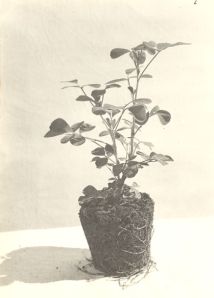 She settled herself down from the aftermath of a squabble, no less real for its invisibility, its unexpressed animus. It had upset her surprisingly little. In five years she had come to know her husband as one might an intimate associate. She had set aside her feelings when she married him, resolving never to venture into the depths she knew to exist behind her ordinary thoughts. She had ignored the advice of friends, one in particular, who had himself succumbed to marriage despite misgivings and who had told her of his regrets.
She settled herself down from the aftermath of a squabble, no less real for its invisibility, its unexpressed animus. It had upset her surprisingly little. In five years she had come to know her husband as one might an intimate associate. She had set aside her feelings when she married him, resolving never to venture into the depths she knew to exist behind her ordinary thoughts. She had ignored the advice of friends, one in particular, who had himself succumbed to marriage despite misgivings and who had told her of his regrets.
She brushed the nap on the arm of the chair she sat in as she tried to recall the details of a conversation. Charles had been a mutual friend of all three of them, Vivian, Edwin, herself, but Edwin had discouraged the friendship, stopping just short of forbidding it, and she had given in, sensing that once having chosen, she could no longer waver. Still, it had seemed a prudent decision to marry, and marriage had enabled her life to go on smoothly, if not indeed so placidly, for the past several years: Until this one; until now.
Now she had the feeling that her life was about to change. She felt something struggling within her, trying to 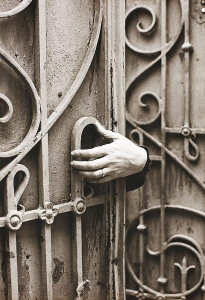 escape its inner bounds, like a thin shaft of grass, a plumule emerging irresistibly from a tiny crack in the pavement, its impetus for growth unimpeded by any discouraging thought of an uncertain future: In darker moments it hovered like an unseen presence in the house, lurking behind the heavy furniture, the clock, the curtains; waiting to spring forth in an unexpected and unguarded moment. Her gaze wandered over her garden, at the roses in the first stage of their summer bloom; old fashioned Albas, their pink and white delicacy somehow resisting the onslaught of the fierce May sun, the tender petals refusing to shrivel and droop, to die until they had lived out their season.
escape its inner bounds, like a thin shaft of grass, a plumule emerging irresistibly from a tiny crack in the pavement, its impetus for growth unimpeded by any discouraging thought of an uncertain future: In darker moments it hovered like an unseen presence in the house, lurking behind the heavy furniture, the clock, the curtains; waiting to spring forth in an unexpected and unguarded moment. Her gaze wandered over her garden, at the roses in the first stage of their summer bloom; old fashioned Albas, their pink and white delicacy somehow resisting the onslaught of the fierce May sun, the tender petals refusing to shrivel and droop, to die until they had lived out their season.
And perhaps she too had refused to wilt and droop under the stultifying depletion of her marriage. There were books to be read, journals to be kept up with, and evenings to be whiled away in light conversation, card games, knitting, embroidery. She had managed by a sheer persistency of effort to engage herself in an unremitting busyness, and to defer this day by polishing her housewifely skills to a high lustre. She had contrived to 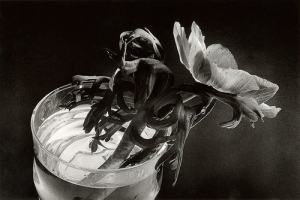 deflect and postpone the very thing which was happening to her now: but now it was here. The thoughts which arose in her mind in the middle of the night when the world receded, the thoughts which haunted her like unquiet souls tapping on the lids of their coffins, were now oh so close to emerging. She was no longer toying with the idea, but entertaining the prospect of their rupture, to wreak havoc on her ordered existence, with a sense of anticipation and even joy. She imagined vaguely how the carefully crafted edifice of her matrimonial endeavours might crumble. She examined her thoughts for a trace of unacknowledged fear. She found a trace of it, but no more.
deflect and postpone the very thing which was happening to her now: but now it was here. The thoughts which arose in her mind in the middle of the night when the world receded, the thoughts which haunted her like unquiet souls tapping on the lids of their coffins, were now oh so close to emerging. She was no longer toying with the idea, but entertaining the prospect of their rupture, to wreak havoc on her ordered existence, with a sense of anticipation and even joy. She imagined vaguely how the carefully crafted edifice of her matrimonial endeavours might crumble. She examined her thoughts for a trace of unacknowledged fear. She found a trace of it, but no more.
She had thought that her marriage might be undertaken in the pioneering spirit of an ancestral sort she had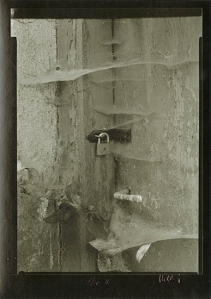 read about in novels, in which home, even homeland, relatives, and close family – everything beloved and familiar – had to be left behind in order to start a new life. She had thought to arrive at a place where the old no longer impinged upon the new, except in the form of a harmless nostalgia, and then only at a great distance. But she had failed to take into account the hardships and tedium of the journey, the toll it would take on her. She had utterly failed to grasp or gauge the extent of her feelings. She could not know of the irrepressible alchemy of thought and sensibility left to ferment in the sealed recesses of her psyche, of the sterility and privation visited upon the remainder of her life by an unnatural sequestration of her natural vitality.
read about in novels, in which home, even homeland, relatives, and close family – everything beloved and familiar – had to be left behind in order to start a new life. She had thought to arrive at a place where the old no longer impinged upon the new, except in the form of a harmless nostalgia, and then only at a great distance. But she had failed to take into account the hardships and tedium of the journey, the toll it would take on her. She had utterly failed to grasp or gauge the extent of her feelings. She could not know of the irrepressible alchemy of thought and sensibility left to ferment in the sealed recesses of her psyche, of the sterility and privation visited upon the remainder of her life by an unnatural sequestration of her natural vitality.
Yet she had felt herself helpless to unstop the lid. She looked at the letter again; at its angular script, and felt herself begin a slow emergence from the fog of her old habits of thought, into a strange place; greener, wilder, and less known in its dangers and delights, than the safe well-ordered pastoral of her history up to the present.
So in the late afternoon, she drove the lovely open miles to Vivian’s house, recalling the past, and realigning 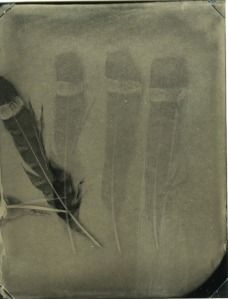 it with the present. a bunch of freshly-picked roses on the seat beside her. She rolled all the windows down, unmindful of the dust, knowing only that the illimitability of the sky must not be denied, and that all her senses must be prevailed upon to bear witness to her slowly yet irresistibly coalescing resolve. She heard with delight the sound of her gears shifting from a minor to a major key as she drove past the houses, copses, fields and tobacco sheds she had now come to recognise.
it with the present. a bunch of freshly-picked roses on the seat beside her. She rolled all the windows down, unmindful of the dust, knowing only that the illimitability of the sky must not be denied, and that all her senses must be prevailed upon to bear witness to her slowly yet irresistibly coalescing resolve. She heard with delight the sound of her gears shifting from a minor to a major key as she drove past the houses, copses, fields and tobacco sheds she had now come to recognise.
She paused in the driveway, still a distance from the front porch, allowing the sound of the engine to die away, waiting for her own thoughts to still. There was that ordinary house, hollyhocks blazing in the last light, a trumpet vine draped thick and sturdy over the side fence, the front door wide open – the sound of summer insects. She waited for the sight of that figure to emerge and walk towards her, in a choreography her mind had rehearsed for endless moments past.
The evening did get on to a propitious start with strong, cold martinis and the conversation they were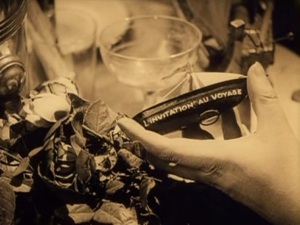 intended to facilitate.
intended to facilitate.
“Why did you do it? Why did you run away?”
“I don’t know – I think I was terrified.”
“Of what?”
“Of that world – those oh-so- assured women – of you even. I was shaking inside. You had suddenly become like them, and I felt you had gone on without me.”
“But surely –”
“Of drowning. I knew I couldn’t swim. I couldn’t keep up – I could hardly even speak! It was all to much for me – I couldn’t do it.
“Couldn’t do what? What was there to do?!”
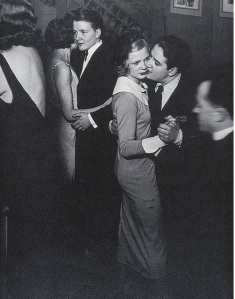 “Those people – you had crossed over from my world to theirs – I felt as if you had left us and gone over to their side, and I could never follow. Those women… I would never have been able to understand them – That world…. I wouldn’t have known what to say – they were all so clever and sharp and – Oh I suppose I felt like an idiot – a child. I felt – I felt you had done that – made me feel like that, like a child who is suddenly made to have dinner with the grown-ups, and who knows she still can’t eat without spilling!”
“Those people – you had crossed over from my world to theirs – I felt as if you had left us and gone over to their side, and I could never follow. Those women… I would never have been able to understand them – That world…. I wouldn’t have known what to say – they were all so clever and sharp and – Oh I suppose I felt like an idiot – a child. I felt – I felt you had done that – made me feel like that, like a child who is suddenly made to have dinner with the grown-ups, and who knows she still can’t eat without spilling!”
“But they were just people – not at all like that! And they were my friends – they had invited me!”
“Oh but they weren’t – just – well, just anything – they seemed older, and sophisticated – they danced with each other! They were unreachable, and unreal – they seemed as if they were from another planet! And then…”
“And then?”
“And then…”
Her voice seemed to lose its footing and stumble against an invisible object which blocked its path.
The whirring of the cicadas grew louder.
“And then – you know ‘and then.'”
“No I don’t! I was there, and I loved you! I told you!”
“Yes you were – but where was I? I felt as if I was somewhere else – maybe floating above the trees with the cicadas.”
She emptied her glass and asked for it to be refilled. The sound of the ice crashed loudly against the shaker.
“You know, here in the South cicadas swarm every 13 and 17 years – its because there are two kinds of them, and since they only swarm together twice every hundred years they don’t get mixed up and breed with each other.”
What are you talking about? I don’t know what you mean – and you’re doing it again. You’re making me dizzy.”
“That’s what you’re doing now.”
“No I’m not. And its only been five – not 13 – or God forbid! 17 years.”
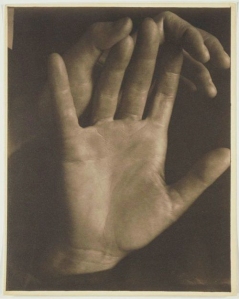 “Only?” It never felt like only to me. And you were my first.”
“Only?” It never felt like only to me. And you were my first.”
“Or to me. And you mine. But you had gone so far ahead of me. And I wasn’t your only, was I? There have been others.”
“Not like this, and they are all in the past.”
“Are you sure?”
“Yes. And I am here now. I didn’t change.”
” I have, but I’m still the old-fashioned sort.”
“Yes, that’s why you married – and I didn’t.”
The words shocked her in the way that ordinary things sometimes do when one sees them in an unexpected way.
“I didn’t know that world – you wanted that world – you already belonged. So I knew you had to be there, and I knew I couldn’t. I knew it was too much for me.”
“You didn’t choose me, you rejected me – and you chose that stodge Edwin! God! I couldn’t believe it – I still can’t.”
“Darling, I couldn’t do it then, I knew it would be too much for me. I couldn’t understand. I was lost. I didn’t want to be made known that way. At least marriage is anonymous. You can say that much for it. I didn’t want to be made public – to be talked about in whispers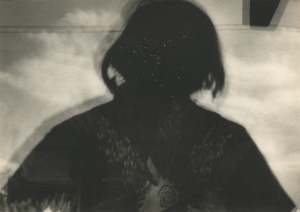 and discretely pointed at – Oh I know you wouldn’t have seen or heard anything, but I would have. I would have felt as if I was being stared at and and whispered about as I walked down the street. I didn’t want private parties, and to have my secrets known.”
and discretely pointed at – Oh I know you wouldn’t have seen or heard anything, but I would have. I would have felt as if I was being stared at and and whispered about as I walked down the street. I didn’t want private parties, and to have my secrets known.”
“I never guessed … It was not at all that way for me. I felt it was a place I could go to from the world, away from it – where I could be myself – with women like me.”
“It wasn’t like that for me. I was terrified. Anyway, its different now isn’t it?”
“Let’s go inside. I’m cold, and we can pick over the rubble some more.”
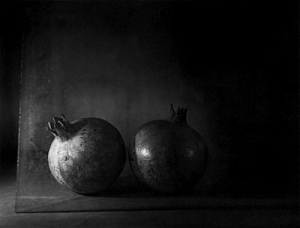 The talk quickened inside.Their words seemed less spread-out than before, and it seemed as if they talked for hours, picking a careful path to the present, sweeping aside the bits of treachery and cowardice and misunderstanding and of course the pain. They came to a shared moment. They discovered to their delight that all there seemed to be to anybody’s salvation, and certainly to their own, was just a second chance.
The talk quickened inside.Their words seemed less spread-out than before, and it seemed as if they talked for hours, picking a careful path to the present, sweeping aside the bits of treachery and cowardice and misunderstanding and of course the pain. They came to a shared moment. They discovered to their delight that all there seemed to be to anybody’s salvation, and certainly to their own, was just a second chance.
It was late, and very dark. Vivian was quietly smoking a cigarette.
“Were you happy – at all – these last years?”
“Happy? hardly happy. I used to think I could be content, but I couldn’t be that either. No; not happy.” She considered the implications of this seemingly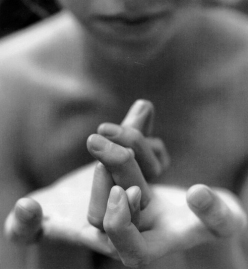 unnecessary question: The reason for it, its unasked counterpart, and searched for both answers. She started to explain how she had thought of herself as being more like a corpse lodged in some underwater tangle, which might at any moment have risen unbidden to the surface, refusing any longer to hide its gruesomeness in the weeds, than anything remotely resembling happy. She expressed herself in words to that effect, sensing that she made an act of contrition in so doing. She drew tight the cord between her mistake, and her remorse.
unnecessary question: The reason for it, its unasked counterpart, and searched for both answers. She started to explain how she had thought of herself as being more like a corpse lodged in some underwater tangle, which might at any moment have risen unbidden to the surface, refusing any longer to hide its gruesomeness in the weeds, than anything remotely resembling happy. She expressed herself in words to that effect, sensing that she made an act of contrition in so doing. She drew tight the cord between her mistake, and her remorse.
“God! that sounds terrible.”
“It feels terrible – even now. I felt like a sinner who wanted to be saved, from my transgressions, because I felt that all my choices had been wrong, and that I was doomed – What could I have chosen anyway? There were no choices left – Until you came back. Why did you?”
“You asked, so I had to.”
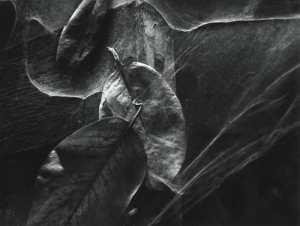 “I merely ‘asked,’ and you ‘had to’? God! I wish I had ever been capable of such clarity. I’ve never been able to read my own heart – until now that is. Everything about it used to elude me; its needs, its desires, its very voice; all mysterious and unknown. That’s why I still can’t trust myself entirely. I’ve been a coward and a fool, and the choices I made, which I thought would keep me from pain, were the very ones which plunged me deepest into the pit.”
“I merely ‘asked,’ and you ‘had to’? God! I wish I had ever been capable of such clarity. I’ve never been able to read my own heart – until now that is. Everything about it used to elude me; its needs, its desires, its very voice; all mysterious and unknown. That’s why I still can’t trust myself entirely. I’ve been a coward and a fool, and the choices I made, which I thought would keep me from pain, were the very ones which plunged me deepest into the pit.”
“And now?”
“And now, I still don’t trust myself to know – Her voice grew clouded, and she felt her eyes turn moist. “I am afraid that I might plunge both of us, all three of us now, into another terrible mess.”
“But you must choose! Remember how you used to quote Pascal? ‘Il faut parier. Cela n’est pas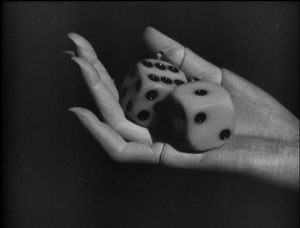 volontaire: Vous êtes embarqué…'”
volontaire: Vous êtes embarqué…'”
“You know that meant something else, and not this – and I did choose, though disasterously. But you should have explained my choices to me when you quoted Pascal to me a long time ago – when we were at that party. You should have explained….”
“How could I have? You didn’t let me. You seemed as if you were about to shatter – and you wouldn’t have understood then. You still might have chosen other than I would have wished.”
“I might have understood more – if you had tried.”
“You made it clear you didn’t want me.”
“Yes – perhaps I did, but you should have known even if I didn’t. You might have been able to make me see…”
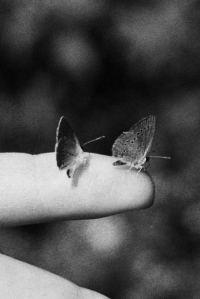 “But this is now – so what about now? – Imagine if you could choose now. What would you choose?”
“But this is now – so what about now? – Imagine if you could choose now. What would you choose?”
She paused for a moment before answering. The sound of a cricket inside the room grew suddenly and feverishly loud.
“I would choose another life – away from there, away from everything: from Edwin.”
“And where would that be”?
“I don’t know – but somewhere far away I think, maybe back in California – and I think it would have to be with you.”
“With me!”
“Yes. You would have to be a part of any complete life I could ever have.”
“Darling, you know the kind of life I have chosen – or has chosen me – It’s not a part of the sane and ordinary world you live in. And I can tell you now about that evening: you were right, you might have been a fish out of water, for all your accomplishments. There were movie actresses there – two in particular whom I’m sure you must have recognised– and a director and a singer, and a famous photographer. I think we were the only ordinary people there. No one there lived – lives – a settled life.”
“But my world is not any longer settled, or ordinary. Its rough and bloody unpredictable and full of gaps and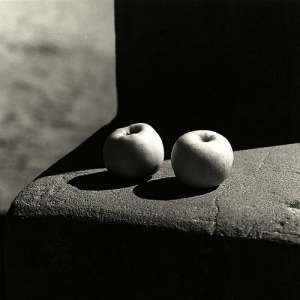 nasty pitfalls, and running into things in the dark.”
nasty pitfalls, and running into things in the dark.”
“And you think another kind of life, a life with me, would be simpler?”
“Not simpler, but – more whole – more of a piece – more… put together. It would be more natural.”
“Oh God! natural! That’s priceless! How ironic! You thought Edwin was natural!”
“I know I deserved that, but you don’t have to remind me. But I did; and he is – but not as I am. I don’t care much anymore about what that the rest of the world might think, and that they will doubtless see things his way and not mine.”
“And I am not merely a bitter – or even a convenient – pill to be swallowed so that you might be cured of a bad marriage?”
“I know. I never meant that you were.”
“Then what did you mean?”
Only that I can no longer be other than myself, even though I don’t quite know what that is, and that I want to find myself there with you – if you let me. I thought I could go to sleep and wake up and leave it all behind me like a dream, but I couldn’t, and I can’t.”
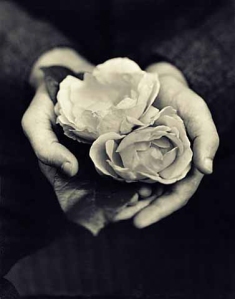 “Are you saying you love me?”
“Are you saying you love me?”
“Yes. That is what I am saying. I have felt like a glass you let fall, and I want to be put back together. I feel I must, because another future might be fatal to all that I am.”
“And are you sure this time? You’re not going to lose your nerve again?”
“No. I know now what I didn’t know before.”
She drove home in the darkest part of the night. She knew herself to be no longer willing to simply succumb to the minatory passage of time: To arrive at senescence a dried up husk, doing a grotesque shuffle in the middle of the dance floor, after the band had left and the music died. She might have gone on protecting what she dared not risk, long after she had ceased to be desirable, shriveling and hardening in odd places, and learning too late that there would be no takers of the sort she had dreamed about, and that she would die with the mouldering hoard of her faded youth and rapidly decomposing beauty. But now she would not. Her memory of the previous hours, slow, halting, tentative then rapturous, electrifying, and ineradicable, would ever mean that she would now choose again.
The stars had advanced in a perceptible slice of arc when she pulled into to her own driveway. For the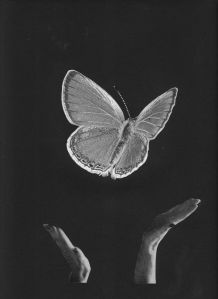 second time that day but in what seemed an indescribable age ago, she sat and waited, listening for her inner clamour to subside and silence to descend. The darkness seemed impenetrable in the moments after she extinguished the headlights. She noticed that the porch light was out, but the window of the bedroom upstairs glowed ominously. She dreaded going inside. As her eyes adjusted she noticed how the outline of the elm tree made deeper incursions into the darkness. She let something in her be invaded by that soothing blackness. She felt the glory of night, its newness to her, its resonance with what was beginning to be fully and quietly infused in her thoughts.
second time that day but in what seemed an indescribable age ago, she sat and waited, listening for her inner clamour to subside and silence to descend. The darkness seemed impenetrable in the moments after she extinguished the headlights. She noticed that the porch light was out, but the window of the bedroom upstairs glowed ominously. She dreaded going inside. As her eyes adjusted she noticed how the outline of the elm tree made deeper incursions into the darkness. She let something in her be invaded by that soothing blackness. She felt the glory of night, its newness to her, its resonance with what was beginning to be fully and quietly infused in her thoughts.
She left Vivian, reluctantly, to return to her own home, still thinking of this place as home, and now she wondered at the word, at its meaning. The house outlined itself against the night like a hulk; a boulder. She had tried to find a place for herself within its walls, 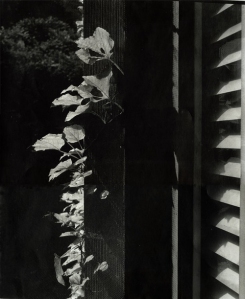 within its shelter, but it had turned on her, constricting and suffocating. Something had gone awry, like a bit of grit caught under an eyelid, and had gone on and on tearing and grinding away at her soft tissues. She had not noticed till this moment how she had felt herself to be both grit and eye.
within its shelter, but it had turned on her, constricting and suffocating. Something had gone awry, like a bit of grit caught under an eyelid, and had gone on and on tearing and grinding away at her soft tissues. She had not noticed till this moment how she had felt herself to be both grit and eye.
He was awake, waiting for her as she had expected. At first their words came measuredly, then erratically, as the bitterness and truth of a conversation long deferred flew about the room like crazed birds beating themselves against invisible panes. She was amazed at how unprepared he was for what he saw his life becoming; at how disabled he was in the unperceived privilege, which had masqueraded in his thoughts as unquestioned as the laws of nature. She pitied him, and was thus rendered impervious to his invective, unwittingly inflicting upon him an unforgettable and unintentioned mortal wound. All of life had seemed unexpectedly to become a weapon leveled him and everything about life that before had been merely ordinary. He stared at her, his lips bursting with unspilled words. She felt his bitterness about to overflow.
There was a moment when he struggled for control. He turned out the light. She could feel him willing her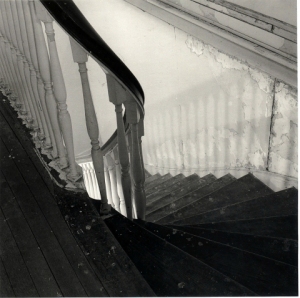 to get into the bed beside him, to take her accustomed place by his side. Disgust mingled with her pity: for his unclouded assumptions regarding the marital servility he had grown to expect and which had made him an unwitting victim to her unexamined, by him, submission. But it lasted only a moment. Sadness, generosity, and again pity, swiftly reasserted themselves within her. She stood silent for a moment, seeing before her a fellow spirit, embarking as she was, albeit along a vastly different path, upon a journey, a destination which only she now wished to reach.
to get into the bed beside him, to take her accustomed place by his side. Disgust mingled with her pity: for his unclouded assumptions regarding the marital servility he had grown to expect and which had made him an unwitting victim to her unexamined, by him, submission. But it lasted only a moment. Sadness, generosity, and again pity, swiftly reasserted themselves within her. She stood silent for a moment, seeing before her a fellow spirit, embarking as she was, albeit along a vastly different path, upon a journey, a destination which only she now wished to reach.
She stooped swiftly to kiss him, then left the room, closing the door gently behind her.
She heard the clock striking as she slowly walked down the stairs.
by Dia Tsung.
Time: Chantal Kreviazuk
